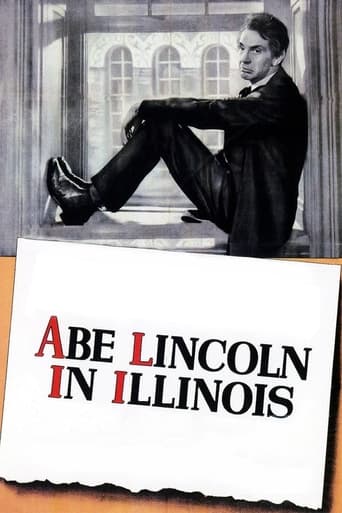


Abe Lincoln in Illinois
Abe Lincoln in Illinois is a 1940 biographical film which tells the story of the life of Abraham Lincoln from his departure from Kentucky until his election as President of the United States.
-
- Cast:
- Raymond Massey , Gene Lockhart , Ruth Gordon , Mary Howard , Minor Watson , Alan Baxter , Harvey Stephens


Similar titles

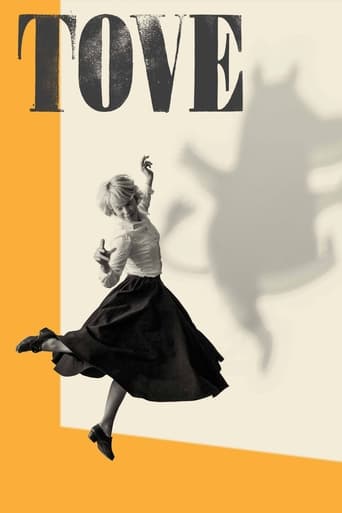
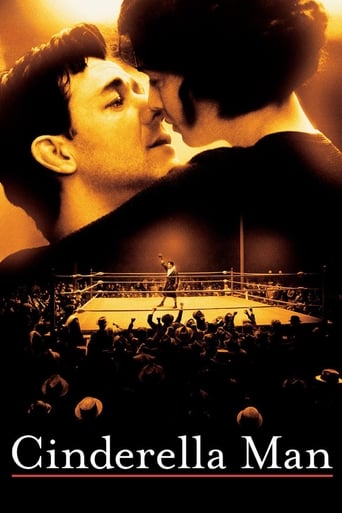
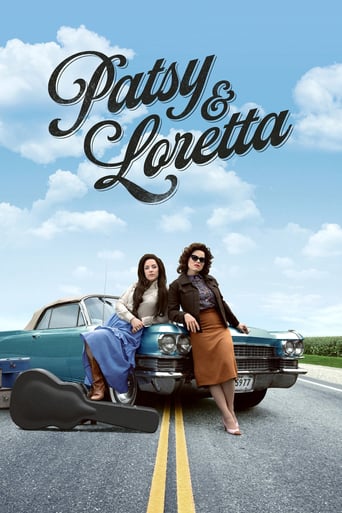
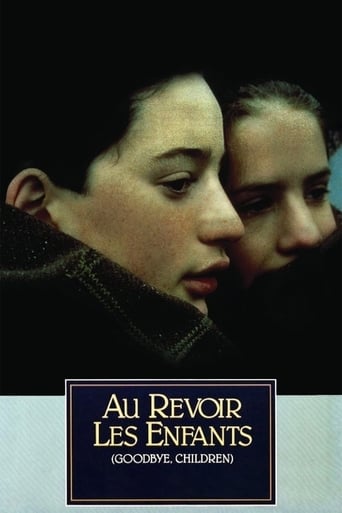
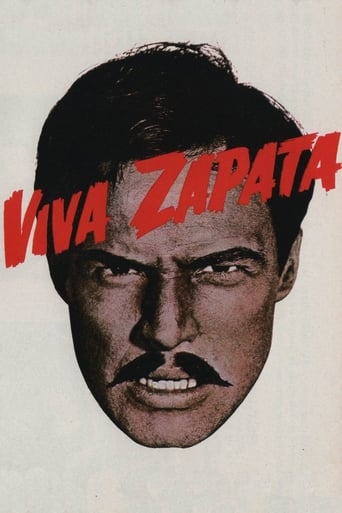

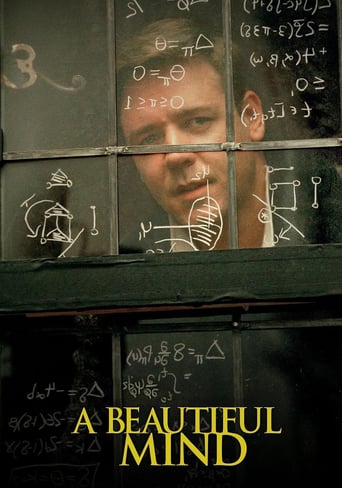
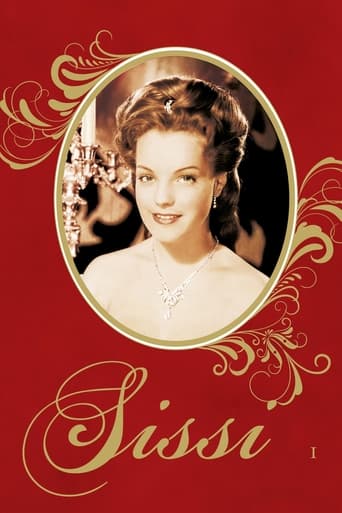
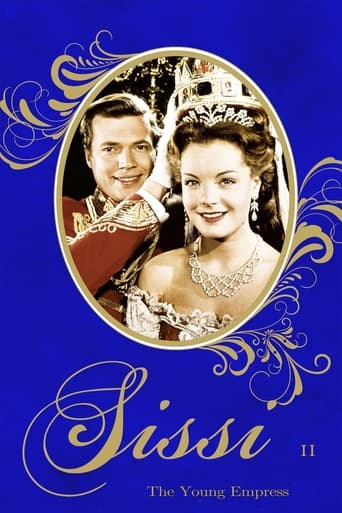
Reviews
That was an excellent one.
Easily the biggest piece of Right wing non sense propaganda I ever saw.
There are moments in this movie where the great movie it could've been peek out... They're fleeting, here, but they're worth savoring, and they happen often enough to make it worth your while.
what a terribly boring film. I'm sorry but this is absolutely not deserving of best picture and will be forgotten quickly. Entertaining and engaging cinema? No. Nothing performances with flat faces and mistaking silence for subtlety.
Evidently historians have pegged Abraham Lincoln as the best Lincoln of the 1800s and Daniel Day-Lewis as the top Abe of the 2000s. According to TCM host Robert Osborne, movie-goers of the 1900s voted with their pocketbooks to make Raymond Massey's turn as the country's most famous rail-splitter the premier Honest A of their time (over Henry Fonda), and the Oscar nominator people agreed. (My dad says there's someone named Hal Holbrook famous for doing Lincoln or Mark Twain a century ago--he couldn't remember which, being up in years over 40 and everything.) Anyway, I watched this last night and I thought this Massey dude was much more convincing as a president-elect age Lincoln that as an 18-year-old Lincoln reading in front of the fireplace. (Leonardo Dicaprio had the opposite problem in J. EDGAR, as everyone knew he still looked like the TITANIC kid at the end, just covered with a foot-and-a-half of make-up!) I guess the lesson here for Hollywood types would be that it's better to age a 50-year-old geezer from 18 to 60 than a 25-year-old kid! (By the way, my summary is comprised of Abe's last words in Illinois, according to this movie, at least.)
If you compare John Cromwell's "Abe Lincoln in Illinois" with John Ford's "Young Mister Lincoln" -- and how can you NOT -- you immediately notice both similarities and differences. Ford's movie appeared a year earlier but Sherwood's play had been around for a while and can probably be considered earlier.Some isomorphisms are so conspicuous that it's likely that the craftsmen for Ford's movie lifted them from the play. Example: It just can't be coincidental that both movie have celebrants doing a polka to the same tune, which, we learn in "Young Mister Lincoln," is "Lovely Susan Brown." Even individual lines of dialog were shamelessly ripped off. If, in "Abe Lincoln in Illnois," Howard Da Silva boasts, "I'm the big buck of this lick," in "Young Mister Lincoln" the line is given to Jack Pennick.Those similarities are superficial and in fact the differences turn them into two almost entirely different movies about the same subject. "Abe Lincoln in Illinois" is more of a biographical sketch that gives us far more of Lincoln's political rise, as well as his romances with Ann Rutledge and, later, Mary Todd. Ford's movie mostly sketches the character of Lincoln and then turns into a courtroom drama leavened with comic incidents.Comparing the two leads, it can be said that Raymond Massey is a more convincing Lincoln than Henry Fonda. Massey simply looks more like the gangling Lincoln, even without Fonda's false nose. Also, for whatever reason, in this instance Massey gives a better performance. Some viewers might wince at Massey's quivering oratory during his debate with Stephen Douglas, but that was the custom at the time. (The film prunes this "house divided against itself" speech.) But -- I'll try to keep this short -- aside from Cromwell's movie covering Lincoln's maturation from a slow youth to his departure with his new whiskers for Washington, while Ford's movie covers a much shorter time span and includes virtually no politics -- Ford's movie is helped immensely by Alfred Newman's multivaried musical score. The Anne Rutledge theme is simple, nostalgic, innocent, and elegant. There's nothing like it in "Abe Lincoln in Illinois." On top of that, Sherwood's narrative (he did the screenplay too) has more serious drama in it, including the conflict between the compliant and peaceable Lincoln and his fiery and ambitious wife, who was later to spend time in an insane asylum. We get far more than an occasional domestic squabble. Sherwood isn't afraid to hit us over the head with reality.Ford, on the other hand, throws history out the window in favor of sentiment and even an attempt at art in some of the incidents and certainly in the photography and lighting. There are two instants of melancholy, both connected with Ann Rutledge's death, and one dramatic incident involving a possible lynching but, that aside, it's more comic than dramatic. Even the murder trial has several amusing moments. (Francis Ford, called for voir dire, puts aside his jug, stumbles to the bench, and pleads, "Guilty.") Massey may be the better performer but Ford is the more subtle director. During moments of gravitas, Cromwell's camera dollies in for a close up of Massey's face, obviously and unnecessarily drawing our attention to the fact that something important is going on, as Massey's voice hesitates before launching some impassioned pronouncement. Ford does it once, when a woman asks, "Who are you?" and Fonda replies, "I'm your lawyer, Ma'am." I'm not counting the end of Ford's movie when Fonda wanders off to the top of a distant hill under an El Greco sky full of menace. Cromwell spells it all out in a final farewell address to the people of Springfield, while Ford keeps it symbolic. (Kids: It's symbolic of the immanent Civil War, fought over slavery and state's rights, between the North and the South. A lot of people got hurt and the South was wrecked. The thunderstorm is a "symbol" because it "stands for" all that impending tumult.) In the end, it's just about impossible to argue that one movie is generally better than the other because they're so different in their intent and execution. Let's call them "unordered variables."I suppose, historically, the movie is kind to Mary Lincoln and her shopping sprees and family background. A TV movie starring Sam Waterston fills in some of the blanks.
I absolutely loved this movie! maybe it is because I am a history buff but I thought it was wonderful!. I am currently doing a project on Abraham Lincoln where my friends and I on working on a student directed film about Abraham Lincoln and you can not imagine how much this movie has helped me. This movie tells the tale of one of the greatest man in history and how he evolved along the way to become even greater. I can only hope that this movie will help someone see the wonders of his life as it helped me and as Honest Abe helped so many other people. I loved it when they showed his debate with Stephen Douglas. That was really the highlight of the movie because it showed him giving his real opinion and it caught my attention. His speech was amazing!! 10 thumbs up!!!! :D
I think it be a foolhardy endeavor to look to this motion picture for an answer about Abraham Lincoln and the life thereof.This film does not provide an answer but more or less an idea about the times which immediately preceded Abraham Lincoln into office.It is nonetheless a very fine film about a truly great man in Abraham Lincoln.I think if there is one thing about these Hollywood films they due tend to mix things up a bit and this particular film is no exception,however that being said,Raymond Massey was as close to the real thing as I have ever seen.A truly remarkable rendition is made by the casting of Raymond Massey as Abraham Lincoln.In so far as his performance,it is equal to his likeness to Abraham Lincoln,unmistakable.The attempt to place certain events as having occurred in Abraham Lincolns life is not without peril because there is next to no information about Ann Rutledge.This seems to be very much the way that these films like to mix things up,I don't think there was such and historically there is no real evidence of any such relation.However it is not unattractive and it is more to the credit of this medium than to Abraham Lincoln.The addition of these false attributes are of another sort and provide only a glance at an underlying problem associated with Hollywood and its film making proclivities,however it is well maintained that this is a top rate motion picture.Perhaps one of the most stirring moments in this picture was the depiction of the Lincoln-Douglas debates and here it,this film and its star,Raymond Massey as Abraham Lincoln shine as the star in the sky.It is perhaps one of the defining moments in this film and indeed it drew much attention in its time as well.Abraham Lincoln did provide for a dramatic farewell however the placing of the Battle Hymm of the Republic was poorly timed,however some of the speeches were stirring then and even now,perhaps Abraham Lincoln does walk at midnight.Mary Todd Lincoln was played by Ruth Gordon and though it can be difficult to judge what life can provide for in the proposal and the subsequent life that Mary Todd and Abraham Lincoln had,here we have almost an ill suited pairing that provide for a wealth of humor and pathos in both the performances by Ruth Gordon and Raymond Massey.There is such a genuine appeal of this backwoodsman in Abraham Lincoln that pleasure in his life and times proceed beyond our ability to judge.It is a film that has the uncanny ability to keep your attention through character development rather than special effects.The performance of Ruth Gordon as Mary Todd Lincoln is as well worthy of the man and his times.It is very dutiful and devoted though no less engaging to watch these two bare three children as time passes.Abe and Mary were to lose there youngest while Abraham Lincoln was in office.The loss had a devastating effect on both parents with special mention in particular to Mary Todd.However,this film does not start here but ends up here and perhaps some mention about the earlier time in the film is worth consideration.It seems that Abraham Lincoln was very much self taught and possessed a desire to know more through his efforts and others efforts in his behalf.It is a little bit confusing as to why they would wish to suggest that Abraham Lincoln did'nt know Shakespeare from one of his plays or sonnets for that matter.I think that is Hollywood and such are there proclivities to a particular kind of thinking.This illusion may in fact suggest something of a racial nature which is not necessarily black but does court influence.The influence here like then was of an arrogant nature and it promised only ridicule and a unreasoning demand.This is one of the sorrows that this film hides in its colloquial attempt to include all in its nature.It is worthy of note that there was cause as to the Civil War and indeed this film showed some of that.The highlighting as to the flint of the fire being the story of John Brown is only the beginning and even more so this film was not so much an attempt to know the causes as to the conflict but was an attempt more so to present the life leading up to that point in time of Abraham Lincoln.This time in history has that about it,it is a flint by which the fires of everlasting virtue are brought upon the life of our greatest president.This film provides in its own right a category which I refer to as Americana.Though indeed we are looking at a motion picture and further we may suggest that there is nothing like the real thing it remains a film as popular and as worth enjoying as any the likes that have come from Hollywood,USA.It has been graded a 10 because it rates great Americana story telling.The only suggestion that I wish to conclude this comment with is that when I saw this film as coincidence would have it,I was in a class entitled "Civil War History" in an institution of higher learning and it made this all the more enjoyable.If you wish to know more about this very dramatic time you might be well served to purchase,"The Civil War,A film by Ken Burns"or maybe become a historian like Bruce Catton because there is more drama in this time period then Hollywood can produce.This comment is being submitted in honor of Presidents Day-Feb.21,2005.
